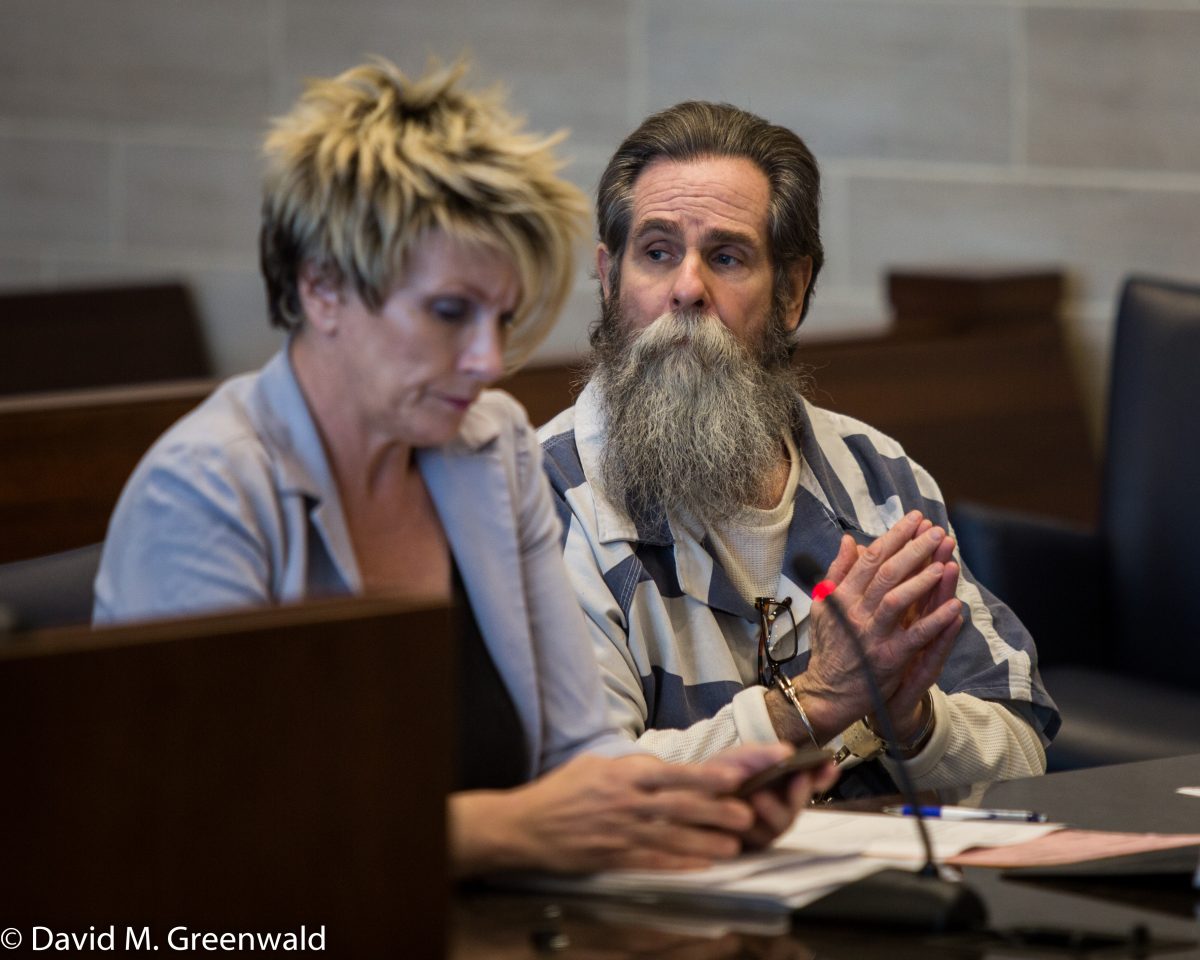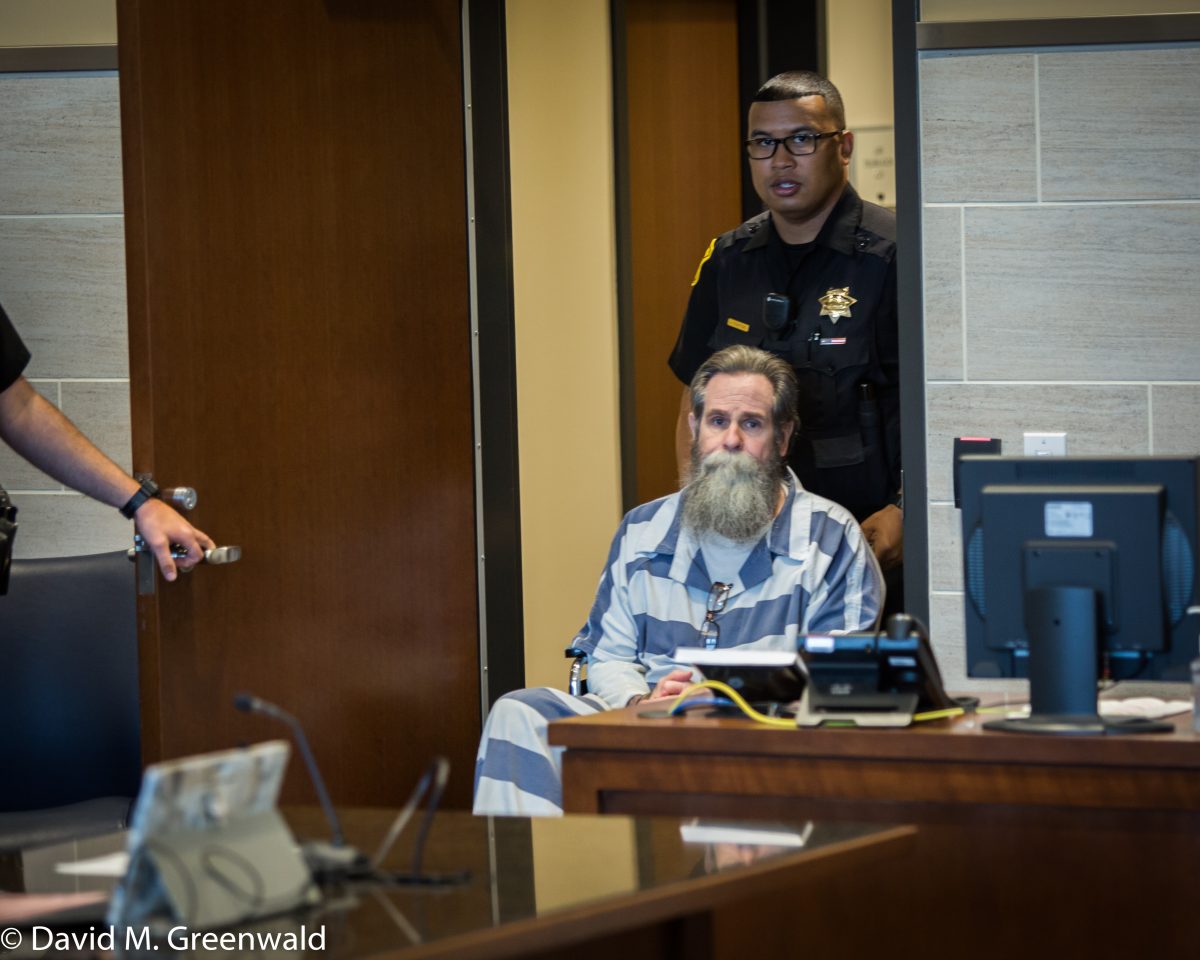
On Wednesday, we saw three drug cases the Vanguard has been covering come to court. Ted Hicks and Ryan Mears have been in the system nearly two years since the raid on their licensed grow, their case settled. Paul Fullerton had already settled his case, but was able to recoup most of the money seized by agents of YONET (Yolo Narcotic Enforcement Team). Finally, it appears that Lyle Nooner is headed to trial, but he was able to recover nearly $250,000 in cash by showing prosecutors the money was legally acquired.
The case of Lyle Nooner, which has drawn our attention based on the alleged conduct of correctional officers at the Yolo County Jail, appears headed to trial, as stated above. However, last week the prosecution and Mr. Nooner reached the settlement regarding property that was seized by YONET in December 2016.
Mr. Nooner has claimed from the start that the entirety of seized assets were legally acquired through the sale of property. However, in the interest of reaching an agreement and “to avoid further litigation” both sides agreed to settle this portion of the case. YONET agreed to release $245 thousand and change of “seized currency” while Mr. Nooner agreed to withdraw his claim and agreed to the forfeiture of $11,831.
The defense maintains that Mr. Nooner purchased a home and sold the assets in order to fund his efforts to help parolees.
His attorney, Michelle Spaulding, explained to the Vanguard, “It was money that Lyle had in the bank when he came back here from Pennsylvania and it was from work – his job with Alan Shortall – a disability pay out, and the sale of his home. He was going to use it to start reentry housing for parolees, consistent with his dedication to the Inside Circle Foundation and the United Front.”
Ms. Spaulding explained that the $11,000 in cash that YONET ultimately seized and retained was “cash that he had at his friend’s house.” She said, “It could likely have been proved up by ATM withdrawals, but Lyle decided to not take any risk of losing the larger amount and forgo his dream and mission to help out the parolees.”
The case will come back for a trial readiness conference in early September, but as of now seems headed for trial.

Paul Fullerton on Thursday got most of his $55,000 in seized assets back. However, he told the Vanguard that they kept $2000 that was boot money and some car part money because it was the only portion he could not fully account for.
Mr. Fullerton had earlier this year settled his case as a misdemeanor, and spent 90 days under house arrest in settling his case that resulted from a 2016 raid on his establishment.
His attorney, Ashley Bargenquast of the Tully & Weiss law firm, told the Vanguard that the People have to show that the money was not clean. However, she said, “We provided all the sources of the money and sources that covered everything that was there.
“The hangups are what the district attorney has,” she said. “But every cent of that money was accounted for if not on receipts but on records and testimony.”
She added, “I would object to anyone saying he had even $2000 worth of drug money. Ultimately one of the issues… Mr. Fullerton’s father used to own an auto shop and there were different car parts, he had been going to auto shows with those parts, but not everybody provides a receipt when you’re at the equivalent of a car show, it’s a hobby you don’t always keep receipts for everything and you don’t have to.”
In addition to taking money, they took phones and there was a particular concern about some personal photos taken that were originals and for which they had no other copies. “They have sentimental value and they want them back,” Ms. Bargenquast explained.
“That lack of paper work, which people don’t worry about having, because why would you have to prove where your money came from, is the hang up of the district attorney on that,” Ms. Bargenquast stated.
“They didn’t want to let go of the last 2,000, the only amount that was not able to be proven or had a paper trail, and that was the fire boot donation money and a small amount of currency that was  the sale of car parts left to me by my late father,” Paul Fullerton explained. “All other funds were either claimed by customers, claimed by owners in the fish store and the store books were clean.. everything else had a paper trail.”
the sale of car parts left to me by my late father,” Paul Fullerton explained. “All other funds were either claimed by customers, claimed by owners in the fish store and the store books were clean.. everything else had a paper trail.”
Ms. Bargenquast indicated, “This was a case where an individual was targeted by law enforcement and they just kept at it until they could build even the sketchiest of cases.”
She added, “The fact that they targeted Maricel (Mr. Fullerton’s wife) is an excellent example. They told her they wouldn’t and they went ahead with it anyway, knowing that that would impact Paul.”
“They don’t give money back to a drug dealer,” Mr. Fullerton told the Vanguard.
The agreement will be finalized on August 13, the date of their next court appearance.
Finally on Wednesday, Ted Hicks and Ryan Mears resolved their nearly two-year-old case. In September 2016, TRIDENT (Tri-County Drug Enforcement Team), a multi-county jurisdiction with agents from Sacramento, Placer and El Dorado counties, raided what appeared to be a legal medical marijuana business near Winters operated by Ted Hicks and Ryan Mears.
While most of the charges had been reduced to misdemeanors as the result of the passage of Proposition 64 two months later, the Yolo County DA’s office retained a felony conspiracy charge in the case.
Steven Plesser, attorney for the two men, told the Vanguard that they did a deferred entry of judgment on a misdemeanor cultivation which means a no-contest plea was entered, and no sentencing or punishment was imposed.
“The court just puts the plea in the file and sits on it for a year,” he said. “As long as they stay out of trouble for a year and comply in any of their business activities with California and local regulations regarding Cannabis, then the plea is torn up and there is no sentencing.”
Mr. Plesser explained, “It gives them a guaranteed dismissal.”
He said that they could have gone the legal route and taken it to preliminary hearing and trial and gotten a similar result. “I think they would have got (it),” Mr. Plesser explained. “But it’s a rather big pain… to go through things.”
He explained that it took a lot of behind-the-scenes maneuvering to convince the prosecution to settle at this point.
The raid nearly two years ago made big news, not only locally but regionally and across the state.
Initially, the Yolo County DA’s office had distanced themselves from the raid, even though the signature of Michael Vroman, a deputy DA, was on the search warrant. However, at the end of the year, on December 28, 2016, Mr. Vroman signed the criminal complaint against Ted Hicks and Ryan Mears.
Rankling some locally was the fact that it was not YONET, but rather TRIDENT, comprised of local, state and federal agents, that conducted the raid.
“California by ballot box, we made it a police state now,” Attorney Mark Reichel, of Reichel & Plesser, explained last year. “They treat drugs the same as they do terrorism. It’s a police state.
“Now by decision, officers can go to other counties to effectuate arrests and do searches,” he said. “The police state is here.”
Brandon Olivera was the commander of TRIDENT which conducted the raids. For Mr. Olivera, the Yolo DA’s decision to charge the men validates their operation.
“I guess TRIDENT isn’t such a terrorist group after all,” he told the LA Times. “We’ve taken a bath in the media and other law enforcement, and thank God the Yolo County D.A. did the right thing.”
Mr. Plesser told the Vanguard that his clients will continue their business, although at this point they will no longer do business in Yolo County after what happened.
—David M. Greenwald reporting






I think it should be the obligation of the government (not an individual) to prove any cash (or property) they seize was obtained illegally.
With that said let’s not pretend that a drug dealer that has $11K in cash “at a friend’s house” got it out of his ATM $200 at a time and “could likely have been proved up by ATM withdrawals” (no one is going to let the government keep $11K if they could spend an hour at the bank to get the proof that it was taken out of their bank account).
It would be nice if the ACLU would spend more time on forcing the US to follow the “innocent until proven guilty” rule and less time on politics…
Alleged drug dealer.
I thought he admitted to growing marijuana (that two years ago as well as today is still considered an illegal drug by the feds)…
P.S. As I have said in the past I think all drugs (except meth) should be legal but unless this guy is saying he had no idea how the pot plants ended up at his property he is not exactly an “alleged” drug dealer…
Too many subjects to use pronouns.
Nooner I don’t think has been a marijuana cultivator. Hicks and Meares were, but were licensed. Fullerton had a medical cannabis operation, but I don’t think he was a grower either.
Add PCP to that list
“unless this guy is saying he had no idea how the pot plants ended up at his property he is not exactly an “alleged” drug dealer…”
Except for the fact that growing and selling are not synonymous.
I think Ken is confusing the defendants here.
There is bipartisan support for restricting the types of cases where government can confiscate property in drug crimes. Given this, then please explain why the laws are not changed.
And if honest, your answer should point to Democrats as being primarily responsible.
The legislature did some reform in 2016. SB 443 requires a conviction in most cases before state and local law enforcement agencies may permanently keep people’s property. Obviously not enough, but it was a change.